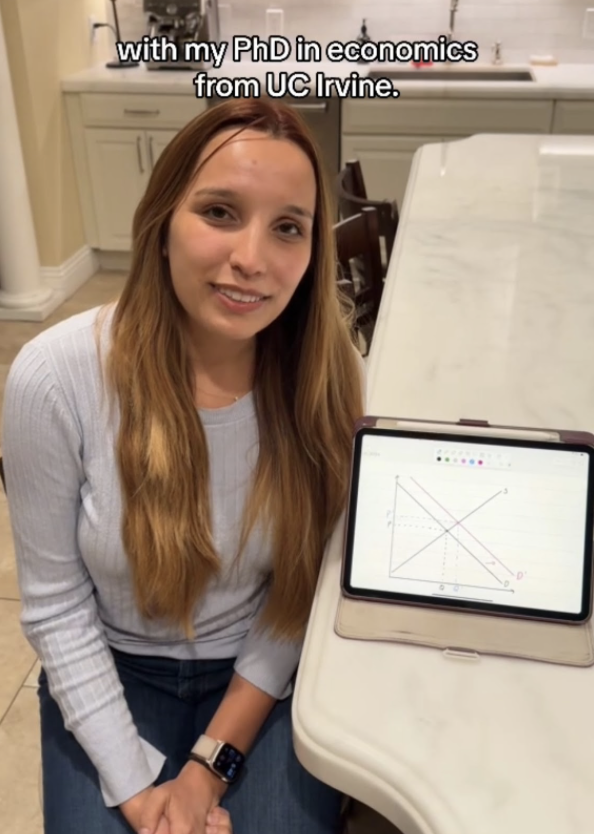College Economics Tutoring
Get connected with a great Economics tutor today.
Economics feels like an odd social science/math hybrid because that’s exactly what it is. For those new to the field of study, it can be a confusing, complex world of seemingly arbitrary graphs and mathematical functions. The good news is that our economics tutors are here to help form the bridge from economics to plain English. Our expert tutors are trained to think like economists, and they can help struggling students by making economic models approachable and digestible.
Frequently Asked Questions
Why Tutoring By A College Professor?
Economics can be a challenging class at every level of study, but students can always excel with the right support and state of mind. We have helped hundreds of students stay on track with their economics courses with personalized instruction meant to meet students where they are in their studies. We can often get students scheduled with a tutor much faster than the university-provided resources or other tutors you may find on the internet. Please call 614-264-1110 today for a free consultation and sign up now.
How is this different from using online resources like YouTube?
Because you’re working one-on-one with a subject matter expert, sessions are tailored to your individual needs. Often, the reason students struggle with new material is because they are not connecting all the dots necessary to solving and correctly interpreting various problems. It can be hard to bridge knowledge gaps without knowing exactly where you are missing information. Our expert tutors can make sure that you are following proper logic and have all the tools you need to learn how to solve various economic problems. Personalized tutoring sessions can then be crafted to shore up any weak areas and give you the confidence to succeed in the toughest of classes.
How are tutoring sessions conducted?
Tutoring sessions are online on Zoom. You can tutor from the comfort of home or the bustle of a coffee shop. It’s up to you. These sessions are based on whatever you would like to cover, so come prepared with questions!
How long are most tutoring sessions?
Students typically tutor in 1 hour increments, but sessions can run as long as you need. You can let your tutor know how long you would like your session to be ahead of time, so they can make sure to fit it in their schedule.
What if I need an emergency tutoring session for a test tomorrow?
Don’t hesitate to call us at 614-264-1110. We can have you connected with a tutor today to begin scheduling.
What economics courses do you help with?
Please see below for a list of some of the economics courses we’re familiar with. If you do not see your student’s class listed below, we have likely still helped with the course previously and are still highly qualified to help-- our tutors are amazing experts in all levels of economics. Please call 614-264-1110 for more information.
Macroeconomics Courses:
Washington University in St. Louis: Econ 1021, Econ 4021, Econ 435, Econ 448, Econ 4721
Emory University: Econ 112, Econ 212, Econ 410
University of Alabama: EC111, EC113, EC309, EC311
University of Indiana: ECON-E 202, ECON-E 322
University of Miami: ECO 212, ECO 301, ECO 303, ECO 379, ECO 403, ECO 420
Vanderbilt University: ECON 1010, ECON 1020, ECON 3022, ECON 3100, ECON 3610, ECON 3650, ECON 3700
Northwestern University: ECON 201, ECON 311, ECON 316, ECON 325, ECON 361, ECON 362
University of Pennsylvania: ECON 2120, ECON 3150, ECON 4130, ECON 4220
Clemson University: ECON 2120, ECON 3150, ECON 4130, ECON 4220
New York University: ECON-UA 1, ECON-UA 12, ECON-UA 13, ECON-UA 331, ECON-UA 336, ECON-UA 367
University of Michigan: ECON 201, ECON 301, ECON 361, ECON 447, ECON 448, ECON 4011
The Ohio State University: ECON 2002.01, ECON 2002.03H
Microeconomics Courses:
Washington University in St. Louis: Econ 1011, Econ 4011, Econ 404, Econ 467, Econ 471
Emory University: Econ 101, Econ 201, Econ 231
University of Alabama: EC110, EC112, EC308, EC310, EC412, EC414, EC415
University of Indiana: ECON-E 201, ECON-E 321
University of Miami: ECO 211, ECO 300, ECO 302
Vanderbilt University: ECON 3012, ECON 2100, ECON 2180
Northwestern University: ECON 202, ECON 310-1, ECON 310-2, ECON 309, ECON 360-1, ECON 360-2, ECON 335
University of Pennsylvania:ECON 2110, ECON 3140, ECON 4120, ECON 4550
Clemson University: ECON 2110, ECON 3140, ECON 4120
New York University: ECON-UA 2, ECON-UA 10, ECON-UA 11, ECON-UA 365
University of Michigan: ECON 202, ECON 302
The Ohio State University: ECON 2001.01, ECON 2001.03H, ECON 4001.01
Econometrics Courses:
Washington University in St. Louis: Econ 413, Econ 4151
Emory University: Econ 320, Econ 423
University of Alabama: EC470, EC471, EC472
University of Indiana: ECON-E 270, ECON-E 470
University of Miami: ECO 430, ECO 520
Vanderbilt: ECON 1500, ECON 1510, ECON 3032, ECON 3035, ECON 3750, ECON 4050
Northwestern University: ECON 281, ECON 336, ECON 381-1, ECON 381-2, ECON 383
University of Pennsylvania: ECON 4050, ECON 4060
Clemson University: ECON 4050, ECON 4060
New York University: ECON-UA 18, ECON-UA 20, ECON-UA 266
University of Michigan: ECON 305, ECON 4015
The Ohio State University: ECON 3400, ECON 4300
Electives Courses:
Washington University in St. Louis: Econ 328, Econ 3311, Econ 432, Econ 4301, Econ 437, Econ 472, Econ 484
Emory University: Econ 190S, Econ 215, Econ 220, Econ 333, Econ 362, Econ 405, Econ 411, Econ 415, Econ 421, Econ 422, Econ 425, Econ 430, Econ 431, Econ 432, Econ 446, Econ 487
University of Alabama: EC416, EC430, EC431, EC473
University of Indiana: ECON-E 303, ECON-E 304, ECON-E 305, ECON-E 307, ECON-E 327, ECON-E 337, ECON-E 375, ECON-E 410, ECON-E 420, ECON-E 450
University of Miami: ECO 351, ECO 441, ECO 442, ECO 444
Vanderbilt University: ECON 2260, ECON 2300, ECON 3300, ECON 3600, ECON 4110, ECON 4550
Northwestern University: STAT 210, ECON 308, ECON 330, ECON 380-1, ECON 380-2
University of Pennsylvania: ECON 3020, ECON 3030, ECON 3100, ECON 3400, ECON 4100, ECON 4400
Clemson University: ECON 3020, ECON 3030, ECON 3100, ECON 3400, ECON 4100, ECON 4400
New York University: ECON-UA 205, ECON-UA 225, ECON-UA 231, ECON-UA 238, ECON-UA 290, ECON-UA 309, ECON-UA 323, ECON-UA 342, ECON-UA 345, ECON-UA 363, ECON-UA 367, ECON-UA 368, ECON-UA 390
University of Michigan: ECON 100, ECON 311, ECON 437, ECON 438, ECON 442, ECON 2001, ECON 4021
The Ohio State University: ECON 1100.01, ECON 1100.02, ECON 2367.02, ECON 1100.01, ECON 2367.02, ECON 4001.02, ECON 4140, ECON 4537, ECON 4597.01, ECON 4800, ECON 4830, ECON 4831
Testimonials
See what Economics students and their parents say about their experience with Tutoring By A College Professor. To search for testimonials by school, go to our Testimonials section at the top:
College Economics Tutoring
Here are some tips from our expert economics tutors:
The first step in any economics problem is to make sure you understand the model you are working under. You can think of the models as rules to a game that determine what type of actions are possible. From there, you are usually trying to determine the optimal result. In beginner economics classes, it is easy to forget that economics is based on mathematical proofs; it helps to identify where the problems are coming from to determine how results should be derived.
The most important thing to remember is: don’t memorize anything! You are much more likely to make mistakes if you try to memorize every possible outcome rather than focusing on how the models work.
Microeconomics Overview:
Microeconomics is the study of how people and firms make decisions at the personal or specific market level. You will study the factors affecting demand of products and how behavior is optimized on the demand and supply sides of the market under various constraints.
Common topics in Microeconomics courses:
Supply, demand, and market equilibrium, Elasticity, Consumer and producer surplus, market interventions, and international trade, Consumer theory, Production decisions and economic profit, Forms of competition, Factor markets, and Market failure and the role of government.
Macroeconomics Overview:
Macroeconomics is the study of large economics factors. There are many more complex models in this field, but your tutors can definitely help walk you through them!
Common topics in Macroeconomics courses:
Macroeconomic concepts and principles, National income accounting, Economic growth and development, Unemployment and inflation, Money and banking, Monetary and fiscal policy, and International trade and finance.
Econometrics Overview:
Econometrics is a branch of statistics where the focus is understanding the effect of many independent variables on a dependent variable of interest. There are many methods and models that students may need to be familiar with in their classes and we can help them become familiar with them. We can also help them conquer STATA or Python for the econometric needs.
Common topics in Econometrics courses:
Econometric methods and models, Time series analysis, and Regression analysis.











